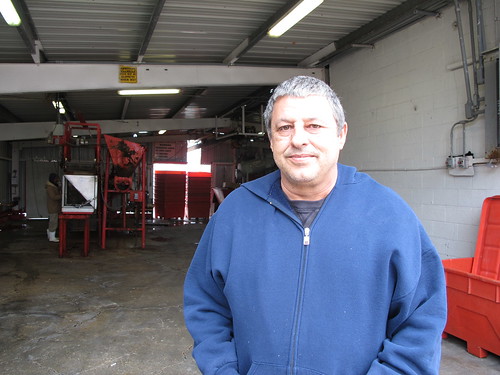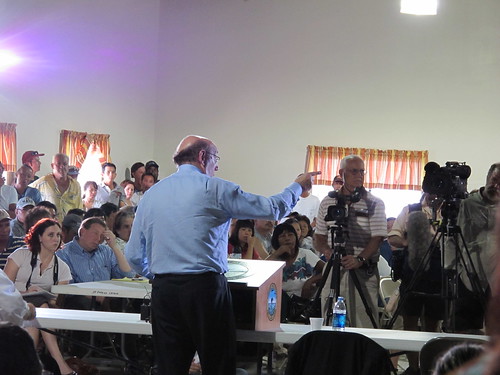A Year After BP Caps Well, Fishermen Still Fight for Survival
A year ago to the day, I attended a packed town hall meeting deep in the Louisiana bayou featuring newly-hired BP claims administrator Ken Feinberg. The faces in the crowd were diverse and anxious; Cajun, Vietnamese, African American, all pressed together in the sweltering heat, trying to find out how to salvage their lives after the worst oil spill in history.
Suddenly in the middle of the meeting came news from Plaquemines Parish President Billy Nungesser: the oil has been stopped! But only a smattering of applause broke out. People worried the damage to their fisheries was serious and the road to recovery would be long.
Now a year after the well was plugged, those fears have been justified. Many fishermen are struggling with the same problems, the same concerns that their livelihoods will never return. The oil is not gone; it keeps coming in places like Grand Isle, LA, and Biloxi,MS, rolling in with the tides as globs of tar balls and sheen. Louisiana beaches near Port Fouchon and parts of the rich fishing grounds in Barataria Bay remain still closed due to oil contamination. No one can predict when they will open again.
Ken Feinberg in Port Sulfur, LA last July Photo: Rocky Kistner/NRDC
But that’s not the story that BP or local government officials paint. According to a recent document posted by BP, everything in the Gulf is recovering nicely and fishing is back to normal. In fact things are going so well, the oil giant argues, that new claims for damages shouldn’t have to be paid. That fits in nicely with BP’s hundred million dollar PR and advertising campaign that keeps rolling out pleasant testimonials from seemingly happy people in the Gulf.
But the reality is much different for many who make their living on the water. Commercial fishermen are still suffering though some of the worst shrimp and crab catches in memory, as rock bottom seafood prices make fishing trips too expensive to make them worthwhile. Many say they are continuing to battle Ken Feinberg’s claims office to get adequate compensation for losses that continue to mount.
Dean Blanchard Seafood is a particularly hard-hit company on Grand Isle, LA. He used to be the largest shrimp buyer in the Gulf, but after the oil disaster struck his shrimp business has been almost cut in half. “We are way below average this year and have taken a tremendous hit," says Dean, who grew up shrimping as a kid. "We figure by this time of year we should have another four to five million pounds of shrimp….the prices are way down. It’s the most stressful thing I’ve been through. And it’s going to get worse.”

Dean Blanchard at work on Grand Isle Photo: Rocky Kistner/NRDC
Blanchard says he’s seen things he’s never seen before; shrimp covered in oil, some green, yellow and orange, and fish with sores he’s stuck his fingers through. What's causing it cannot be proven yet, but the water still doesn't seem right to many fishermen. They fear the worst will come as future generations of fish and sealife reproduce in an environment they say is still contaminated with oil.
In Venice, LA, Kindra Arnesen’s husband David usually would be shrimping right now, but there not enough shrimp to catch to make it worth it. So instead he’s fishing deep offshore for mackerel and snapper. She counts herself as lucky since many fishermen don’t have licenses of equipment to fish that far out. “I’m shocked that BP has been allowed to run amok, say Kindra, who has fought for better cleanup efforts since the beginning. "Their commercials are everywhere. But nothing’s changed since the oil spill. The politicians haven’t changed the laws to protect us. We can’t allow them to continue to destroy the Gulf.”
Louisiana shimpers Darla Rooks and her husband Todd are also facing financial ruin, and they say they have received nothing recently from BP to help them get through the worst shrimp season in memory. “I’m not sure what we’re going to do,” Darla says. “We can’t afford to shrimp with these kinds of catches and prices. We’re all sick. Guess I’m going to have to throw out some catfish traps in the river or get a job at Lowes. We have to do something else to survive.”
Watch NRDC’s film Stories from the Gulf that aired on Discovery Channel's Green Planet last April. Watch "Stories from the Gulf: Living with the Oil Disaster," a half-hour documentary produced by NRDC with narration by Robert Redford, aired on Discovery Channel's Planet Green April 23 of this year.
For fishermen like these, the well capping a year ago was a Pyrrhic victory, a confusing and conflicting symbol that the disaster was over and life as normal would return. Soon after, the media left, and with it the nation's attention. The only story that most people around the country hear these days is the one from BP.
But the folks who work and live on the water tell a different story. BP has not made it right for them and their families. Many say their future is even more uncertain today. Scientists say it will take years to really know the impacts of this disaster on the ecosystem and the wildlife that bore the brunt of the BP's oily assault.
Along the gulf, locals know the oil is not gone. It's impacts are still being felt by the fishermen who have made their living on the water for generations. They continue to suffer from the oil's effects while the rest of the world passes them by.

